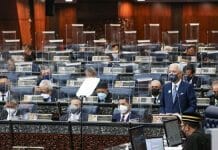By MDEC
The Covid-19 outbreak has accelerated the growth of digital economy and opened up avenues to various new digital businesses. As businesses pivot online, the need to lay a solid foundation to aid this new wave of digitalisation is crucial to ensure that Malaysia can holistically transform itself towards an advanced digital economy.
In 2020, a total of 45 MSC Status projects were approved with investments worth RM3.9 billion. This will pave the way for 3,794 new employment opportunities for Malaysians. Out of the total, RM2.6 billion (66.2 percent) came from domestic investments, while RM1.3 billion (33.8 percent) came from foreign investments.
Global tech firms who have operations in Malaysia such as NTT, Hitachi Sunway Information Systems, transcosmos and DKSH CSSC continue to show confidence by re-investing in Malaysia.
“2020 may not have been a vintage year for foreign direct investments but we continue to see investment momentum in our digital tech industry. Recent commitment from global giants such as Huawei and Dell Technologies is a glowing endorsement of Malaysia’s digital capabilities, platforms and infrastructure, propelling us on course to be the Heart of Digital ASEAN,” said Raymond Siva, MDEC’s Senior Vice President, Investment and Brand Division.
The digital economy is expected to continue its significant contribution to the country in 2021 based on an estimated 19.1 percent contribution to GDP in 2019 by the Department of Statistics Malaysia, on the back of a 6.7 percent economic growth forecast this year by the World Bank.
The Malaysia Digital Economy Blueprint (MyDIGITAL), announced recently by the Prime Minister also projects a 22.6 percent contribution to GDP by 2025, opening up 500,000 jobs within the digital economy.
Leading digital companies such as PCCW Solutions (a leading IT services provider in Hong Kong, mainland China and Southeast Asia); ThunderSoft (Beijing-headquartered) and Clarivate (a global leader in providing solutions to accelerate the lifecycle of innovation) have also set up regional presence in Malaysia, pointing to a growing momentum and confidence in Malaysia as an attractive investment hub.
From its diversified multi-lingual and digitally-skilled talent pool; ready infrastructure and mature ecosystem for the digital economy to thrive, it directly reflects Malaysia’s role as a first-mover for the digital economy, leading the country on course to a shared prosperity for all, a society centred on 4IR technologies and in line with Malaysia 5.0, firmly establishing itself as the Heart of Digital ASEAN.
Overcoming digital divide through digital technologies
Malaysia’s digital transformation is a journey and today, MDEC’s initiatives revolve around developing skillsets within 4IR and emerging digital technologies, for example in areas such as Big Data Analytics (BDA), Artificial Intelligence (AI), Internet of Things (IoT), Financial Technology (FinTech), Data Centres, Cloud Services and robotics.
On the digital infrastructure front, MDEC is helping to foster an enabling environment for rapid digitalisation by working with key stakeholders to support the growth of the digital economy. This is in support of the Governments’ initiatives to nurture public-private partnerships, a critical step in accelerating Malaysia’s digital transformation.
“The era of digitalisation has arrived, and we cannot deny this. We have all seen the profound impact digital transformation has had on world economies, particularly amid the COVID-19 pandemic, which has resulted in a violent shift to digital. Moreover, thanks to the role that data plays in the digital economy, we are witnessing increasingly massive returns, through innovation as well as the opening of new opportunities for jobs and economic growth. With that being said, the onus is on us to ensure that no one gets left behind and that everyone gets access to the benefits of technology — and the
introduction of the MyDIGITAL blueprint couldn’t have come at a better time,” said Huawei Technologies (Malaysia) Sdn. Bhd.’s Chief Executive Officer Michael Yuan.
“In order to contribute actively and consistently to the country’s digital acceleration, there are three key technologies that we must leverage — 5G, Cloud and AI. These are the technologies that are ultimately driving our new intelligent world. Everything will be connected, data-driven and intelligently processed in real-time for actionable outcomes. This is a message that we will continue to drum home,”
“5G, for one, will unleash a world of opportunities by simply enhancing connectivity and mobility. This next-generation wireless technology will deliver higher data speeds, low latency and connect more devices at one time. Hence, 5G is billed as the catalyst for unlocking potential growth across industries such as medical, education, agriculture, smart cities and more importantly, dramatically transforming the way humanity lives, enterprises work, and the way we interact with the environment for seamless connectivity. When combined with BDA, Cloud Computing, AI and other innovative technologies, this will accelerate the arrival of a golden age of information over the next decade,” Yuan said.
Yuan added that the same sentiment can be said of Cloud Computing, the “backbone” of digital transformation. “Without a doubt, the widespread adoption of Cloud Computing amid the exponential growth in data volume goes to show that it is increasingly being accepted as a main platform for innovation. Furthermore, when paired with AI, these technologies will enhance flexibility, agility and resilience to digital solutions, therefore giving rise to further innovation, introducing new revenue streams and driving cost efficiencies not only for businesses, but all sectors of the economy as well as society,” Yuan said.
Therefore, MDEC and Huawei will continue to conduct joint research and services related to digital technologies by working with various government bodies to publish white paper studies for the benefit of improving Malaysia’s digital economy.
“We at Huawei are working hard and closely with our strategic partners to deliver the best advancements that technology can offer. Our joint initiatives and efforts with our partners in delivering 4G and 5G capacity solutions for a personalised experience, innovation in 5G network design, as well as deployment and operating efficiencies remain our top agenda in the years ahead. Recently, we joined forces with CyberSecurity Malaysia and Celcom Axiata Bhd to jointly establish the first 5G Cybersecurity Test Lab in Southeast Asia here in Malaysia, with the goal of developing and bringing new 5G use cases for various industries to commercialisation when the new 5G spectrum is made available. And our efforts towards propelling Malaysia to greater heights via technology will not stop here,” said Yuan.
“By the same token, we are ever committed to our partnership with MDEC to provide a thriving digital environment. At the end of the day, we only have one goal in mind, which is to bring digital to every person, home and organisation for a fully connected, intelligent world. We want to breach the digital divide, reach the unreached, and do everything we can to make sure that no one is left behind in enjoying the fruits of prosperity from the digital economy.” Yuan said.
Data is key for Malaysia’s digital economy
Meanwhile, Dell Technologies’ Senior Vice President for South Asia and Managing Director of Malaysia, Pang Yee Beng said the country has gone through almost a full year of navigating uncertainties and challenges due to Covid-19.
“As a technology company, Dell Technologies has had a front-row seat to the overnight digital transformation of our world. We are going through unprecedented changes impacting every aspect of life, and what we’ve experienced as a nation has required all of us to pivot to new ways to keep our economy and lives intact and progressing forward. Through it all, one thing is certain – technology will be central to how we work, learn and live in the new normal of the future, more than ever before.
“Malaysia’s vision of a digital economy is clear. The launch and implementation of MyDIGITAL is a strategic move to build economic resilience and transform the country into a digital, high income nation – paving the way for Malaysia to be ready for the next phase of the digital era in what we call the ‘data decade’. All this is very much aligned to what Dell Technologies set out to do – providing transformational solutions that help build the digital future for organisations and communities. Our purpose and commitment to our stakeholders remain unchanged as we continue to innovate and deliver for our customers in extraordinary ways when they need us most,” he added.
Over the next ten years, the amount of data will only increase. This explosion of data will give rise to other innovations, such as multi-cloud IT strategies, intelligent devices with AI and machine learning capabilities that will change the way one works and collaborates and the “Edge” where everything is connected – systems, applications, services, people and places will be crucial. To succeed in the data era, businesses must take control of their data – their most prized asset – and that means prioritising digital transformation.
Dell Technologies first took foothold in Malaysia 26 years ago and at present, operates three facilities across Malaysia which serves as an integral site supporting regional and global operations. In June 2019, the Dell Digital Labs was established at its global business centre in Cyberjaya, one of the few laboratories Dell Technologies has invested in globally over the last few years. The new facility helps build cloud-native software and at the same time grooms a highly skilled Malaysian workforce that is trained for the data-driven era.
“The establishment of a national agency in MDEC (Malaysia Digital Economy Corporation), tasked to lead the charge, has driven significant digitalisation across the public and private sectors. The initiatives put in place in the past decades have all been geared in this direction. We support MDEC’s efforts to seeing them through and look forward to opportunities to work together,” Pang said.









